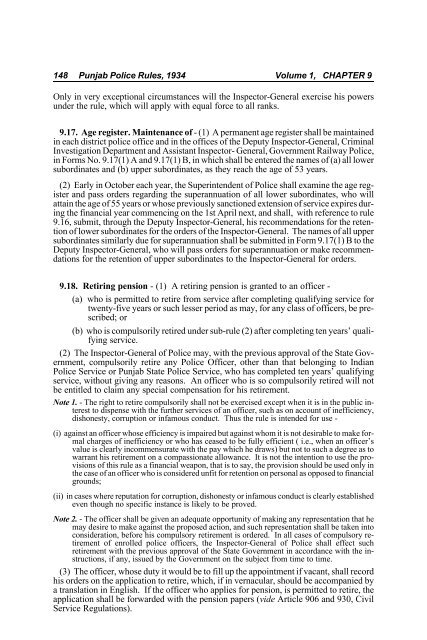Punjab Police Rules Volume 1 - Sangrur Police
Punjab Police Rules Volume 1 - Sangrur Police
Punjab Police Rules Volume 1 - Sangrur Police
Create successful ePaper yourself
Turn your PDF publications into a flip-book with our unique Google optimized e-Paper software.
148 <strong>Punjab</strong> <strong>Police</strong> <strong>Rules</strong>, 1934 <strong>Volume</strong> 1, CHAPTER 9<br />
Only in very exceptional circumstances will the Inspector-General exercise his powers<br />
under the rule, which will apply with equal force to all ranks.<br />
Rule 9.17<br />
9.17. Age register. Maintenance of - (1) A permanent age register shall be maintained<br />
in each district police office and in the offices of the Deputy Inspector-General, Criminal<br />
Investigation Department and Assistant Inspector- General, Government Railway <strong>Police</strong>,<br />
in Forms No. 9.17(1) A and 9.17(1) B, in which shall be entered the names of (a) all lower<br />
subordinates and (b) upper subordinates, as they reach the age of 53 years.<br />
(2) Early in October each year, the Superintendent of <strong>Police</strong> shall examine the age register<br />
and pass orders regarding the superannuation of all lower subordinates, who will<br />
attain the age of 55 years or whose previously sanctioned extension of service expires during<br />
the financial year commencing on the 1st April next, and shall, with reference to rule<br />
9.16, submit, through the Deputy Inspector-General, his recommendations for the retention<br />
of lower subordinates for the orders of the Inspector-General. The names of all upper<br />
subordinates similarly due for superannuation shall be submitted in Form 9.17(1) B to the<br />
Deputy Inspector-General, who will pass orders for superannuation or make recommendations<br />
for the retention of upper subordinates to the Inspector-General for orders.<br />
Rule 9.18<br />
9.18. Retiring pension - (1) A retiring pension is granted to an officer -<br />
(a) who is permitted to retire from service after completing qualifying service for<br />
twenty-five years or such lesser period as may, for any class of officers, be prescribed;<br />
or<br />
(b) who is compulsorily retired under sub-rule (2) after completing ten years’ qualifying<br />
service.<br />
(2) The Inspector-General of <strong>Police</strong> may, with the previous approval of the State Government,<br />
compulsorily retire any <strong>Police</strong> Officer, other than that belonging to Indian<br />
<strong>Police</strong> Service or <strong>Punjab</strong> State <strong>Police</strong> Service, who has completed ten years’ qualifying<br />
service, without giving any reasons. An officer who is so compulsorily retired will not<br />
be entitled to claim any special compensation for his retirement.<br />
Note 1. - The right to retire compulsorily shall not be exercised except when it is in the public interest<br />
to dispense with the further services of an officer, such as on account of inefficiency,<br />
dishonesty, corruption or infamous conduct. Thus the rule is intended for use -<br />
(i) against an officer whose efficiency is impaired but against whom it is not desirable to make formal<br />
charges of inefficiency or who has ceased to be fully efficient ( i.e., when an officer’s<br />
value is clearly incommensurate with the pay which he draws) but not to such a degree as to<br />
warrant his retirement on a compassionate allowance. It is not the intention to use the provisions<br />
of this rule as a financial weapon, that is to say, the provision should be used only in<br />
the case of an officer who is considered unfit for retention on personal as opposed to financial<br />
grounds;<br />
(ii) in cases where reputation for corruption, dishonesty or infamous conduct is clearly established<br />
even though no specific instance is likely to be proved.<br />
Note 2. - The officer shall be given an adequate opportunity of making any representation that he<br />
may desire to make against the proposed action, and such representation shall be taken into<br />
consideration, before his compulsory retirement is ordered. In all cases of compulsory retirement<br />
of enrolled police officers, the Inspector-General of <strong>Police</strong> shall effect such<br />
retirement with the previous approval of the State Government in accordance with the instructions,<br />
if any, issued by the Government on the subject from time to time.<br />
(3) The officer, whose duty it would be to fill up the appointment if vacant, shall record<br />
his orders on the application to retire, which, if in vernacular, should be accompanied by<br />
a translation in English. If the officer who applies for pension, is permitted to retire, the<br />
application shall be forwarded with the pension papers (vide Article 906 and 930, Civil<br />
Service Regulations).


